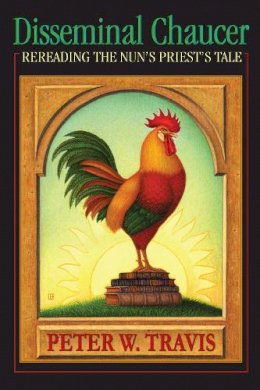Peter W. Travis is Henry Winkley Professor of Anglo-Saxon and English Language and Literature at Dartmouth College. He is the author of many influential articles and Dramatic Design in the Chester Cycle.
“Travis does not so much approach the Chaucerian text armed with the tenets of deconstructive interrogation; rather, he sees the text as itself an actively self-consuming artifact, if I may borrow this apt phrase, engaged in its own self-questioning, parodying its own operations of meaningfulness even as it makes the search for meaningfulness a profoundly human possibility. The result is an exhilarating read that no Chaucerian should miss.” —Studies in the Age of Chaucer “A 443-page book on a 626-line poem about a rooster must be up to something, and one can tell pretty quickly that it must be something good, for Peter Travis writes with authority, ambition, generosity, and wit.” —Modern Philology “The strongest element of this book is Travis’s impressive ability to dig deeper into the story’s parody and to historicize the tale within medieval educational practice and theory.” —Parergon “Informed by modern and postmodern literary theory, Peter Travis’s ambitious and comprehensive study, Disseminal Chaucer articulates fresh insights and offers a significant new reading of Chaucer’s beast fable as a Menippean didascalic parody. . . . A learned, cogent, and often provocative analysis, Disseminal Chaucer is a substantial achievement and sure to inspire further research in Chaucerian scholarship and medieval textuality.” —Sixteenth Century Journal “The book’s fresh approach to detail and its sustained linguistic attention is newly appreciated, innovative in its return to a textual focus too often neglected for larger theorizations and narrow historical contexts. Travis shows us, yet again, the compelling power of strong, sustained close reading for one of Chaucer’s best stories.” —Journal of English and Germanic Philosophy “Peter W. Travis’s Disseminal Chaucer: Rereading the Nun’s Priest’s Tale is a 443-page reconsideration of the Nun’s Priest’s Tale that explores in depth a cluster of seemingly minor, but notoriously baffling, narrative and poetic details.” —The Year’s Work in English Studies "This is an elegantly written meditation on what is arguably Chaucer's most intertextually challenging poem. . . . Disseminal Chaucer pulls off a difficult feat: it provides an exhilarating scholastic romp through a tale that many of us assume we know all too well. . . . [T]he book's sensitive meditations on what it means to be both a medieval and modern reader of Chaucer should be required reading for anyone who teaches Chaucer." —Speculum “Disseminal Chaucer is a book that spans a generation of Chaucer scholarship. Many of the book’s arguments and insights will be familiar, but the act of bringing these materials together and fleshing out the underlying thesis they share gives them new freshness and power. The parts already were impressive, but the sum is more impressive still . . . essential reading for students of Chaucer’s meta-poetic masterpiece.” —Review of English Studies “Offering stimulating, sometimes brilliant ‘high-intensity interrogations’ of ‘The Nun's Priest's Tale,’ Travis looks at passages and elements of the tale in terms of rhetorical, logical, and political contexts. He links these with an overall claim for Chaucer's ultra-self-consciousness about these elements, about producing a poetry that elicits thinking about thinking . . . a commentary on a single tale that ranks among the most searching and critically sophisticated studies to date of Chaucer.” —Choice "Peter Travis's long-awaited study of The Nun's Priest's Tale is without a doubt the most comprehensive and thorough treatment of the tale that we have or are ever likely to have. It is a bravura performance, an extremely well argued study that marks it as a significant contribution to Chaucer studies, one that will be closely read and consulted by both students and scholars of Chaucer alike." —Jim Rhodes, Southern Connecticut State University

